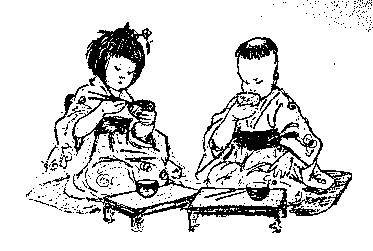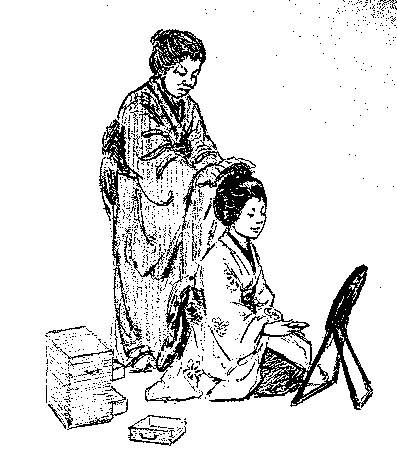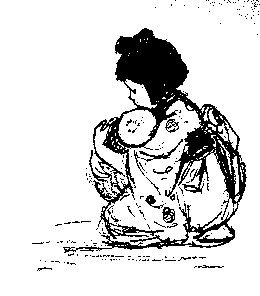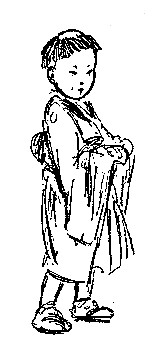| 1999-2004 (Return to Web Text-ures) |
Click Here to return to The Japanese Twins Content Page Return to the Previous Chapter |
 (HOME) |
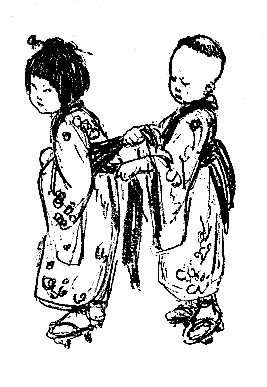 II MORNING IN THE LITTLE HOUSE ONE morning when Bōt’Chan was just one month old, his big brother Taro woke up very early. The birds woke him. They were singing in the garden. "See, see, see," they sang. "Morning is here! Morning is here!" Taro heard them in his sleep. He turned over. Then he stretched his arms and legs and sat up in bed, rubbing his eyes. The candle in the tall paper lamp beside his bed had burned almost out, but it was light enough so he could see that Take, in her bed across the room, was still asleep, with her head on her little cushion. Taro called very softly, "Take, Take, wake up!" But Take slept so soundly she did not hear him. Father and Mother and the Baby were all asleep in the next room. He did not want to wake them, because it was still so early in the morning. So he crept softly along the floor to Take's bed, and whispered in her ear, "Wake up, wake up!" But she didn't wake up. Then Taro took a jay's feather which he had found in the garden the day before, and tickled Take's nose! 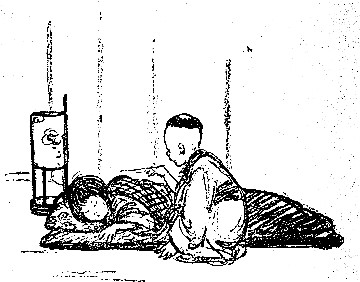
First she rubbed her nose. Then she sneezed. Then she opened her eyes and looked at Taro. "Sh-sh," whispered Taro. "But I haven't said a single word!" Take whispered back. "You sneezed, though," said Taro. That's just as bad. It will wake up our honorable parents just the same." "Well, you shouldn't tickle my poor little nose, then," said Take. "Your honorable nose was tickled so that you would wake up and hear the birds sing," said Taro. "It is much nicer than sleeping! Besides, do you remember what is going to happen to-day? We are going to take Bōt’Chan to the Temple!" A temple is something like a church, only they do not do the same things in temples that we do in our churches. The Twins loved to go to the Temple, because they had a very good time when they went there. They liked it as much as you like Thanksgiving Day and the Fourth of July. When Take remembered that they were going to take Bōt’Chan to the Temple, she clapped her little brown hands. "Oh, I'm so glad!" she said. Then she popped out from under the covers of her bed and stood up on the soft straw matting. She was no sooner out of bed than from far away came the "Cling-cling-clang" of a great gong. And then, "Tum -- tum -- t-r-r-rum" rolled a great drum. "Hark!" said Taro. "There go the Temple bells, and the priests are beating the sunrise drums! It's not so very early, after all." "Now, you'll hear Grannie's stick rapping for the maids to get up," Take answered. "The Temple bells always wake her." And at that very minute, "Rat -- tat -- tat" sounded Grannie's stick on the woodwork of the room where the maids slept. 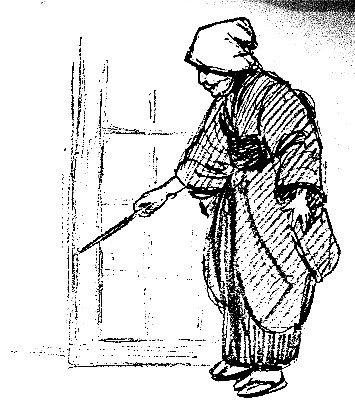
In the little house in the garden where the Twins lived, there are no thick walls. There are only pretty wooden screens covered with fine white paper. These screens slide back and forth in grooves, and when they are all shoved back at once the whole house is turned into one big, bright room. This is why the Twins had to be so careful not to make any noise. Even a tiny noise can be heard all through a house that has only paper walls, you see. 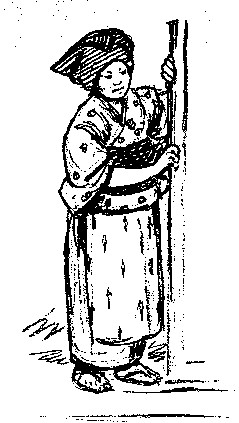
But every one is supposed to get up at sunrise in the little house in the garden, anyway. The maids were stirring as soon as Grannie called them. They rolled back the shutters around the porch and made so much noise in doing it that Father and Mother woke up too. Then the Twins didn't keep so quiet any more. "I'll beat you dressing," Take said to Taro. She ran to the bathroom to wash her face and hands, and Taro ran to wash his in a little brass basin on the porch. "Be sure you wash behind your ears, Taro," Take called to him. "And it's no fair unless you brush your teeth hard!" Taro didn't say anything. His toothbrush was in his mouth, and there wasn't room for words too. So he just scrubbed away as hard as he could. Then he ran back to his room and dressed so quickly that he was all done and out in the garden before Take began to put on her little kimono! You see, all Taro's clothes opened in front, and there wasn't a single button to do up; so he could do it all himself -- all but the sash which tied round his waist and held everything together. Take always tied this for him. When Take came out into the garden she had her sash in her hand. Taro had his in his hand. "I beat!" Taro called to her. "You haven't got your sash on yet," Take called back. You haven't either," said Taro. "We both of us didn't beat then," said Take. "Come here and I'll tie yours for you." Taro backed up to Take, and she tied his sash in a twinkling. Then she held up her sash. " Now, you tie mine for me, Taro," she said. "Wait until Mother can help you," said Taro. "Boys shouldn't do girls' work." "Oh, please, Taro," said Take. "I tied yours for you. I don't see why you can't tie mine for me!" "Well, you know what Father said," Taro answered. "He said you are a girl and must mind me. You get Mother to do it." "He said you should be kind and noble, too," said Take. "It would be kind and noble of you to tie my sash, because I 'm just suffering to have it tied." She looked at him sidewise. "Please do," she said. Taro thought it over. Then he said, "Well, come behind the lantern, and just this once I'll do it. But don't you tell, and don't you ask me to again." "Cross my heart, Taro," Take promised. "I won't tell. You are a good, kind boy." Taro tied the sash the best he could, but it looked very queer. It looked so queer that when, after a while, their Mother saw it she said, "Come here, my child; your sash is tied upside down! But I know it is hard to reach behind you. I must teach you how to make a nice big bow all by yourself," And Take never told her that Taro did it. No one ever knew it until this minute! When they were all dressed, the Twins ran out into the garden. There had been a shower in the night, and the leaves were all shiny, they had been washed so clean by the rain. The dew sparkled on the green iris leaves beside the tiny river, and the sunshine made the fish look like lumps of living gold in the blue waters of the little lake. The birds were singing in the wistaria vine that grew over the porch, and two doves were cooing on the old stone lantern that stood by the little lake. They were Taro's pet doves. Taro held out his fingers. "I haven't forgotten to bring you something," he called. 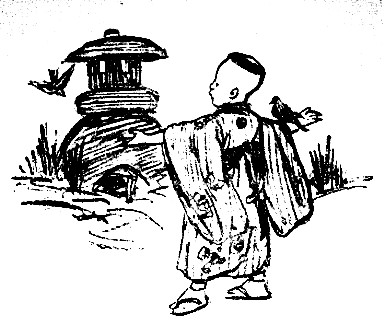
The doves flew down and lit upon his shoulders. Taro took a few rice kernels from the sleeve of his kimono -- which he used as a pocket -- and fed the birds from his hand. They were so tame they even picked some from his lips. "I will feed the fish too," Take said. And she ran to the kitchen where the maids were preparing breakfast. She came back with some white rice wafers in her fingers. First she threw some tiny bits of the wafer into the water. The fish saw them and came to the surface. Then Take reached down and held the wafer in her fingers. The little fish came all about her hand and nibbled the wafer without fear. One of them even nibbled her finger! 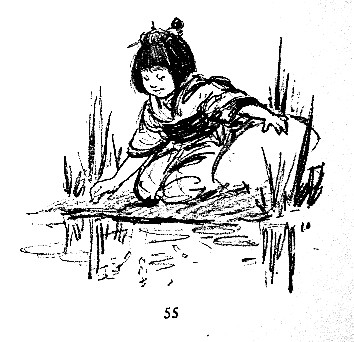
Take laughed. "Mind your manners," she said to the little fish. "It's not polite to try to eat me up when I 'm feeding you! I'm not your breakfast, anyway!" Just then they heard the tinkling sound of a little gong. "Ting-ting-ting!" sang Take to the sound of the gong. "Breakfast is ready." And she danced up the gravel walk to the house, her hair bobbing up and down, and her sash flying in the wind, so that she looked like a big blue butterfly. Taro came too, and they sat down on mats in the kitchen, to eat their breakfast. Their Mother was already serving their Father's breakfast to him in the next room. By and by she and Grandmother would have their breakfast with the servants.
This is a picture of the Twins eating their breakfast. They each had a tiny table of red lacquered wood. On each table were two bowls. In one bowl was soup, and in the other rice. Taro took up his soup-bowl with both hands. He was in a hurry. "Oh, Taro!" Take said. "What would Mother say! You must be more polite. You know that isn't the way to hold your bowl." Taro set his bowl down again, and took it up carefully with one hand, just as you see him in the picture. Take began to eat her rice. She had two little sticks in her right hand. She used these sticks instead of a fork or spoon. But Take was in a hurry too. She spilled a little rice on the front of her kimono! Taro saw it. "You're just as impolite as I am," he said. "It's just as bad to spill as it is to hold your bowl wrong." "Oh, dear me! Then we're both impolite," said Take. "What would Mother say!" "She'd be ashamed of us," said Taro. "Let's see if we can't remember every single one of our manners after this," said Take. Just as they were finishing their rice there came the sound of steps -- Clumpity -- clumpity -- clump! "Who's coming?" said Taro. "I think it's the hairdresser," Take answered. She ran out to see. An old woman was on the porch. She had just slipped off her clogs.
In Japan no one thinks of such a thing as wearing street shoes in the house. It would bring in dirt and soil the pretty white mats. That was why she took them off. Take bowed to the old woman. "Ohayo?" she said politely. "Ohayo?" said the old woman to Take, The Twins' Mother heard them. She came to the door. She bowed to the old woman, and the old woman bowed to her. "Come in," said the Mother. "I hope you will make my hair look very nice today, because we are going to the Temple." The old woman smiled. "I will make it shine like satin," she said. The Mother got out her little mirror and sat down on the floor. The hairdresser stood behind her and began to take down the Mother's long black hair. Bōt’Chan had been awake a long time. Taro was playing with him on the floor. The Mother called Take. "Daughter," she said, "a little nap would make our baby wide awake and happy when we start for the Temple. Would you like to put him to sleep?"
Take loved to put Bōt’Chan to sleep better than anything else in the world. She took him in her arms and hugged him close. Then she swayed back and forth, and sang this little song:1
"How big and beautiful Sir Baby Boy is growing! "When he becomes a good boy, too, then I will make our garden larger, and build a little treasure house for him. "Next to the treasure-house I will plant pine trees. Next to the pine trees I will plant bamboo. Next to the bamboo I will plant plum trees. "To the branches of the plum trees shall be hung little bells! When those little bells ring, O Sir Baby Boy, how happy you will be!"
She sang over and over, and softer and softer, about the little bells; and by the time the hairdresser had finished the Mother's hair and gone away, Bōt’Chan was fast asleep. Then Natsu put him down on some soft mats, and combed Take's hair. Take stood still, like a brave little girl, though there were three snarls in it, and Natsu pulled dreadfully! When every one was ready to go, they looked very splendid indeed. They all wore kimonos of the finest silk, with the family crest embroidered on the back and left sleeve. And Bōt’Chan had new clothes that Grannie and Mother had made especially for him to wear on his first visit to the Temple. When everybody else was dressed and ready, Natsu waked Bōt’Chan and put his new clothes on him. "Now, we can start," said the Mother. She took Bōt’Chan in her arms. Natsu slid open the door, and they all stepped out on the porch. ______________________ 1 Adapted from translation by Sir Edwin Arnold. |
